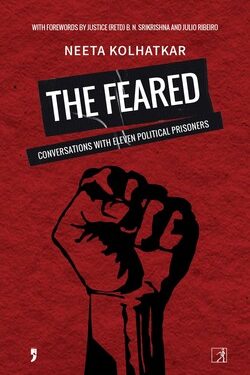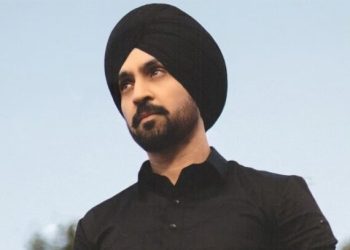Reviewed by Harsh Thakor
The Feared is a collection of interviews conducted by Neeta Kolhatkar with 11 political prisoners and, in some cases, their loved ones. Through these conversations, she vividly portrays their everyday lives within multiple prisons across India. This landmark work is a path-breaking contribution to resurrecting the spirit of dissent and resistance at a time when proto-fascism is reaching unprecedented heights.
The book serves as a wake-up call to the gross human rights violations inflicted on thousands of under-trials. Kolhatkar’s detailed discussions—some spanning multiple meetings—reveal personal anecdotes from the prisoners’ time behind bars. She brings to light not only their experiences but also the deplorable prison conditions, including issues related to space, hygiene, medical care, and food. The research offers a comprehensive and disturbing insight into life within prison walls, particularly how conditions deteriorated to near-unbearable levels during the COVID-19 pandemic, with grievances left unaddressed.
Beyond its urgent call for prison reforms, The Feared is also a compelling narrative of resilience, courage, and endurance. It captures stories of solidarity and the unexpected bonds formed in confinement. Kolhatkar interviewed members of trade unions, communist parties, and even the Shiv Sena, providing a diverse spectrum of perspectives. Above all, she underscores the critical role of journalists as the fourth pillar of democracy—a role that is rapidly eroding.
The book features conversations with political prisoners such as Sudha Bharadwaj, Nilofer Malik, Sameer Khan, Koel Sen, Prashant Rahi, Shikha Rahi, Sanjay Raut, Kishorechandra Wangkhem, Anand Teltumbde, Rama Ambedkar, Binayak Sen, Kobad Gandhy, Muralidharan K, and P. Hemlatha. These interviews introduce an element of suspense and unpredictability as they explore the circumstances of their arrests and the harsh realities of their incarceration.
Kolhatkar offers one of the most incisive examinations of the growing fascist tendencies within the Indian state. She highlights how the ruling BJP has dealt a severe blow to the fabric of democracy and the Constitution. The book not only documents the erosion of human rights but also ignites a call for resistance against neo-fascist injustice. The interview with Sudha Bharadwaj, in particular, stands out as deeply moving.
Drawing parallels between India’s political prisoners and the treatment of dissenters under Nazi Germany in the 1930s, Kolhatkar examines the fascist nature of laws like the UAPA. She also references Peter Benson’s research on political prisoners in Portugal during the same period.
The book provides an in-depth psychological analysis of imprisonment, revealing how incarceration often strengthens a prisoner’s resolve rather than breaking their spirit. Through meticulous research and extensive conversations with prisoners and their families, Kolhatkar uncovers the lasting psychological scars inflicted by prolonged incarceration. She notes, “The first night in jail is reputed to be the hardest. After that, you learn how to survive, though many prisoners carry lifelong scars.”
Kolhatkar also shares her motivation for writing The Feared, emphasizing the need to shift public perception about political prisoners. She states, “People assume that if someone is behind bars, they must have done something wrong. It’s time we understand that being imprisoned doesn’t necessarily mean guilt. One of the aspects I wanted to highlight was the mental toll on prisoners and their families. Even after acquittal, many continue to live in fear because the legal battle never truly ends.”
The book features a powerful introduction by Julio Ribeiro, who examines the stripping of human rights from prisoners and critiques India’s growing neo-fascism. He condemns the hypocrisy of a nation striving for economic supremacy while suppressing fundamental freedoms. Ribeiro provides a gripping account of the injustices faced by Sudha Bharadwaj in Yerawada Jail, Pune, and Byculla Jail, Mumbai, and the ostracization of Varavara Rao, who was denied contact with his family. He also recounts the unjust incarceration of Kishore Chandra Wangkhem in Manipur for opposing the glorification of the Rani of Jhansi.
Justice Srikrishna, in his foreword, discusses the prolonged incarceration of political prisoners and the grim state of Indian jails. He stresses the importance of upholding free expression, regardless of ideology, and condemns the practice of imprisoning individuals merely to silence dissent. He remarks, “I am a Hindu, but that does not mean I should hate someone who isn’t or put them behind bars. These political prisoners have not been convicted of any crimes, yet they remain incarcerated. Even if a person is convicted, they do not cease to be human, even though some of their constitutional rights may be restricted.”
At the book launch, senior advocate Aspi Chinoy also shed light on the appalling state of Indian prisons, emphasizing that “any self-respecting civilized nation cannot allow such conditions to persist.” He pointed out that political prisoners like Gautam Navlakha, Sudha Bharadwaj, Varavara Rao, and Arun Ferreira, accused in the Bhima Koregaon case, have been acquitted in most of the cases against them. “The goal is not to convict them but to detain them indefinitely. People are jailed for years simply because of their political beliefs. Anand Teltumbde was denied a mosquito net, and Father Stan Swamy was denied a sipper. Indian jails are overcrowded, lacking even basic necessities. They should not be turned into concentration camps,” he added.
Kolhatkar expresses deep gratitude to those who supported her in bringing The Feared to life, including Sanober Keshawar, Freny Maneckshaw, Susan Abraham for documentation resources, Ramya Sharma for encouragement, and Carol Andrade, Father Rudy Heredia, Rupa Pannalal, Mondipa Mukherjee, and Advocate Sunip Sen for moral support.
—
Harsh Thakor is a freelance journalist






